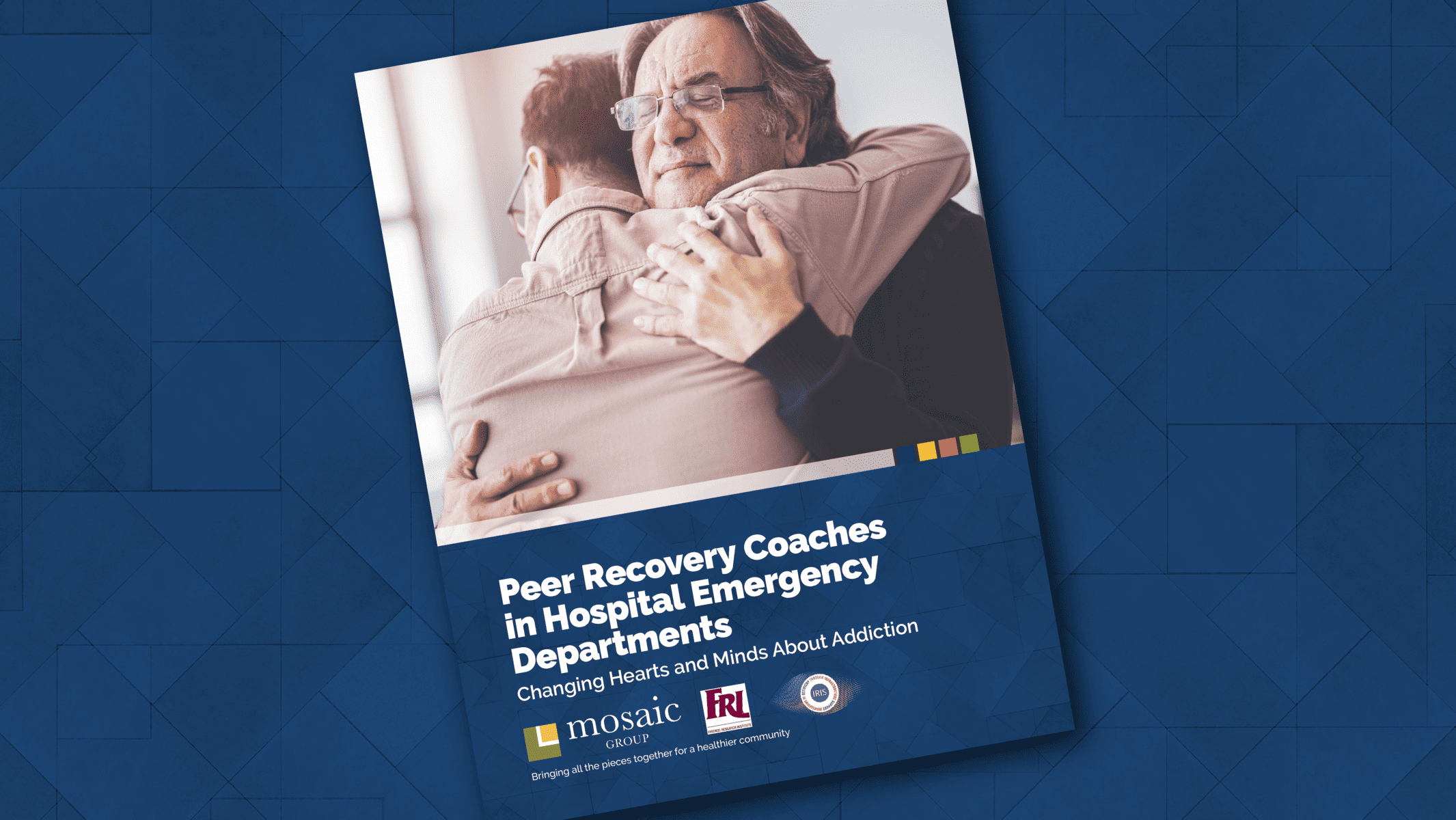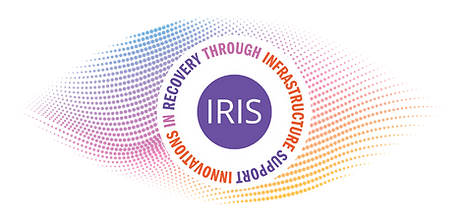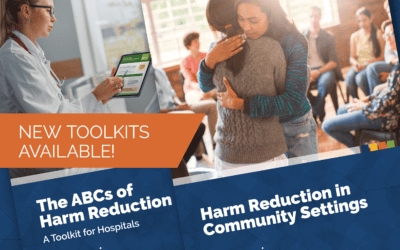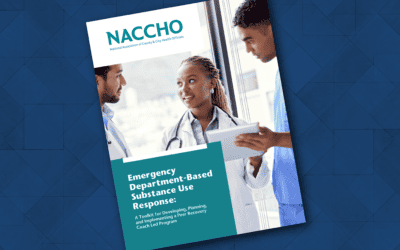Peer Recover Coaches in Hospital EDs: Changing Hearts and Minds About Addiction
This report was developed by Friends Research Institute, Inc. and Innovations in Recovery through Infrastructure Support (IRIS)—a National Institutes of Health, National Institute on Drug Abuse funded initiative—in partnership with The Mosaic Group.
Executive Summary
This study shows that employing Mosaic Group’s “Reverse The Cycle” Peer Recovery Coaches (PRCs) in hospital emergency departments can revolutionized attitudes towards addiction, improved care for individuals with substance use disorders, and fostered a more compassionate environment. The insights in this report demonstrate the potential of PRCs to significantly improve outcomes and contribute to addressing the opioid crisis with empathy and support.
About This Report
This report explores the transformative findings from a study conducted to examine the impact of implementing Peer Recovery Coaches (PRCs) in Maryland’s hospital emergency departments (EDs) as part of the “Reverse the Cycle” program. The study utilized semi-structured interviews with key stakeholders from three hospitals actively involved in the program’s implementation, including ED Medical Directors, Nursing Leaders, Peer Supervisors, and PRCs. By gathering perspectives on the program’s impact and the critical role of PRCs in coordinating care, this study sheds light on the significant contributions of PRCs in revolutionizing attitudes towards addiction and enhancing care for individuals with substance use disorders.
Program Details and Significance
Mosaic Group’s “Reverse the Cycle” program represents an innovative initiative designed to expand Screening, Brief Intervention, and Referral to Treatment (SBIRT) within EDs, with a particular focus on addressing the alarming opioid crisis. PRCs have been instrumental in this program, delivering brief interventions and facilitating treatment referrals within EDs.
Additionally, PRCs offer vital training to ED staff on evidence-based approaches to treating substance use disorder, including the effective utilization of pharmacotherapy for opioid use disorder (OUD). Furthermore, the program has established a rapid referral network to connect patients promptly with community treatment providers, a process in which PRCs play a critical role by ensuring seamless and timely care for individuals struggling with OUD or experiencing overdose.
Transformative Impact of PRCs in EDs
The study’s findings demonstrate that the presence of PRCs has brought about a profound cultural shift within EDs. Prior to their implementation, ED staff faced significant challenges in adequately addressing the complexities of SUDs, resulting in inadequate care and referrals for patients. The burden of managing SUD-related complications overwhelmed EDs, leading to increased stigma and negative attitudes towards addiction. However, with the introduction of PRCs, the knowledge base, available resources, and overall understanding of ED staff have undergone a significant transformation.
PRCs as Catalysts for Change
PRCs have successfully bridged the knowledge gap by providing specialized expertise in addiction and recovery. They have become invaluable resources within the ED environment, alleviating the workload of other ED staff and streamlining the referral process for patients with SUDs. Moreover, PRCs have become living success stories, sharing their personal journeys of addiction and recovery, fostering empathy, and cultivating positive relationships with their colleagues. Consequently, attitudes towards individuals with SUDs have shifted from stigmatization to empathy and support, creating a more inclusive and compassionate environment within EDs.
Implications and Future Considerations
The implementation of PRCs has yielded not only improved treatment outcomes but also a fundamental shift in the culture of care within EDs. PRCs have played a pivotal role in educating and empowering ED staff, dispelling misconceptions surrounding addiction, and promoting evidence-based interventions. Their presence has not only addressed the immediate needs of patients with SUDs but also fostered a long-term transformation in the overall approach to care within the ED environment.
The following key considerations have been identified to facilitate the successful implementation of Peer Recovery Coach (PRC) programs in the future:
- Flexible human resource policies accommodating unique requirements of hiring PRCs,
- Assessing cultural fit during the hiring process for harmonious integration,
- Comprehensive onboarding, regular check-ins, and clear role boundaries for effective management of PRCs,
- Managing time constraints and developing policies for PRC relapse,
- Ensuring transparency and support in the implementation of PRC programs.
Cultural integration emerges as a crucial factor in maximizing the impact of PRCs. This involves assisting PRCs in understanding the organizational system, managing expectations regarding support from other staff, and actively promoting proactive discussions and introductions to foster successful integration. Demonstrating the worth and productivity of PRCs requires aligning the number of PRCs with patient volume needs, cross-training them for additional tasks, and emphasizing comprehensive documentation of their interactions within electronic health record systems.
Conclusion
The valuable insights and lessons learned from the implementation of PRCs in EDs presented in this report provide essential guidance for future implementations in various healthcare settings. By effectively addressing the challenges faced by EDs, fostering a cultural shift towards empathy and support, and promoting compassionate care, PRCs have the potential to significantly improve outcomes for individuals with SUDs and contribute to the development of a more empathetic and supportive healthcare system. This study underscores the critical role of PRCs in transforming attitudes towards addiction and enhancing care delivery for individuals with SUDs, ultimately paving the way for a more comprehensive and holistic approach to addressing the opioid crisis in emergency healthcare settings.
About Mosaic Group
Mosaic Group, is nationally recognized for effectively implementing community health and human services strategies to achieve health equity. Our primary focuses are:
- Community Solutions for Health Equity
- Complex Planning for Sustainable Change
- Behavioral Health Integration
- Overdose Prevention and Response
Download The Full Report
"*" indicates required fields
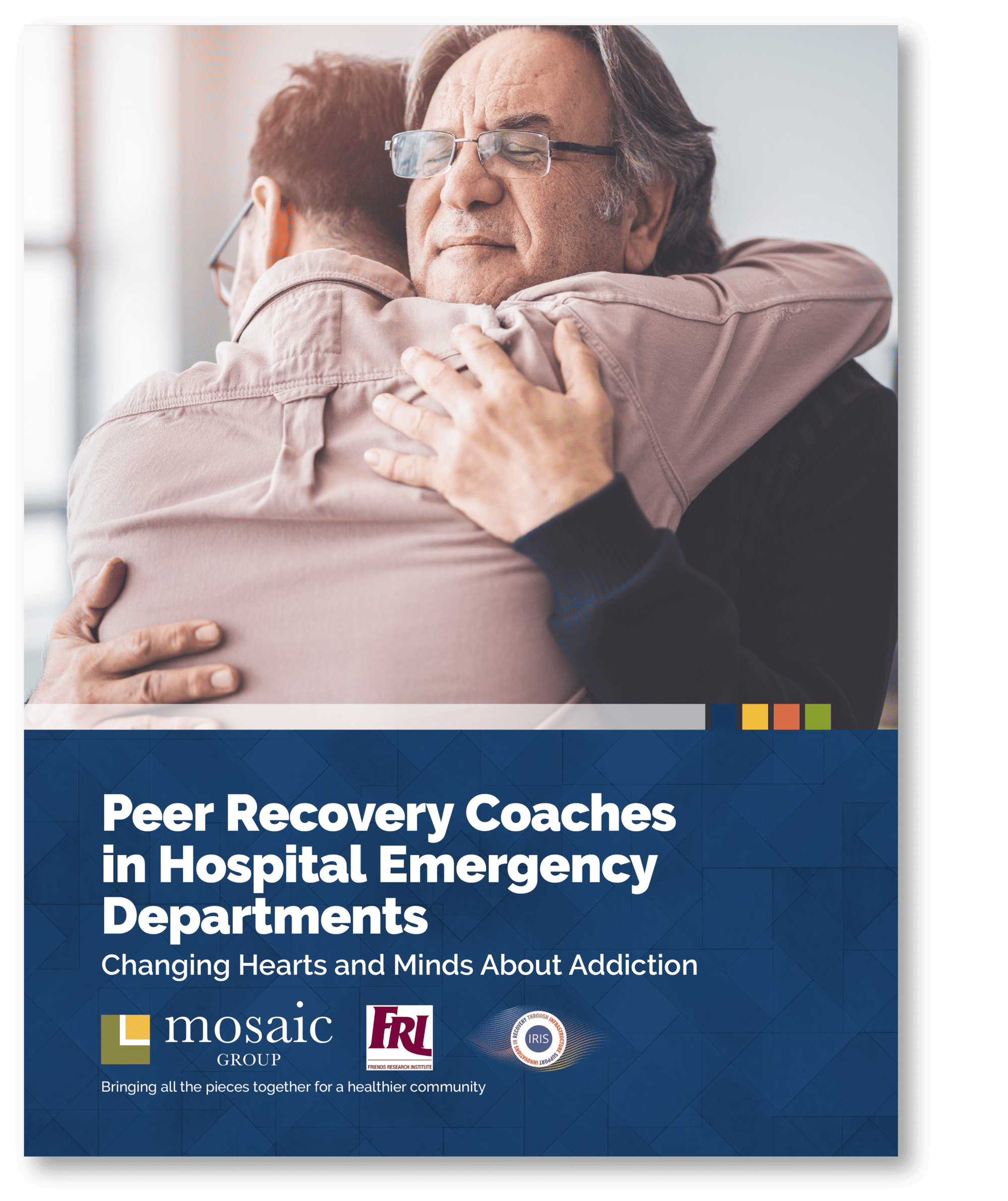
“PRCs have become invaluable resources within the ED environment, alleviating the workload of other ED staff and streamlining the referral process for patients with SUDs.”
“The implementation of PRCs has yielded not only improved treatment outcomes but also a fundamental shift in the culture of care within EDs, fostering empathy and support for individuals with SUDs.”
Partners
Friends Research Institute, Inc. and Innovations in Recovery through Infrastructure Support (IRIS)—a National Institutes of Health, National Institute on Drug Abuse funded initiative—in partnership with The Mosaic Group.

